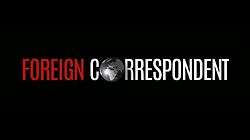Foreign Correspondent (TV series)
Foreign Correspondent is a weekly Australian documentary series and current affairs program screened on ABC, Tuesdays at 8:00 pm (AEDT), Wednesdays at 11.30am as well as on ABC News on Saturdays at 6.30pm. It is also available on iView or on the Foreign Correspondent website. ABC News also repeats the program on Thursdays at 2.30pm if parliament is in recess. The program premiered at 7:30 pm on Saturday 14 March 1992. Its aim is to provide information about the happenings in other countries either on the light side of life or during crises.
| Foreign Correspondent | |
|---|---|
 Foreign Correspondent opening titles | |
| Genre | Documentary |
| Country of origin | Australia |
| Original language(s) | English |
| No. of seasons | 28 |
| Production | |
| Executive producer(s) | Matthew Carney |
| Running time | 30 minutes |
| Release | |
| Original network | ABC ABC News |
| Picture format | 576i (SDTV) 1080i (HDTV) |
| Audio format | Stereo |
| Original release | 14 March 1992 – present |
| Chronology | |
| Related shows | Four Corners (1961 – present) |
| External links | |
| [abc.net.au/foreign Website] | |
Foreign Correspondent has been one of Australia's leading programs in its genre since its premiere, and has won several awards, including the Walkley Awards for Excellence in Journalism and White House News Photographers' Association.[1] Since its launch, the news teams have travelled more than 170 countries and produced more than 1,650 reports.
Impact
Correspondents on the program have received attention from other media outlets than the Australian Broadcasting Corporation. Crikey covered Eric Campbell's presence in Thailand after he became a subject of the country's lèse majesté laws, which forbids criticism of the monarchy.[2] The Sydney Morning Herald's website featured an article about foreign correspondent Sally Sara as she opened up about her experience in an Afghan military hospital.[3]
There are currently 15 correspondents on Australian Foreign Correspondent. Their work can be found on several media platforms: TV, radio, online and on social media.[4]
USA, Canada, Europe and Asia all have their own versions of the program.
In 2014, China warned ABC that there would be wider implications over its program on Xinjiang.[5]
Notes
- "Complete list of awards". Foreign Correspondent. ABC News.
- Crook, A. "Eric Campbell to be banned from Thailand after 'Foreign Correspondent' report". Crikey.
- Meade, A. "Foreign Correspondent Sally Sara opens up about traumatic experience in an Afghan military hospital". The Sydney Morning Herald.
- "Foreign Corresponding — A Conversation". Meanjin.
- "Chinese embassy warns of 'wider implications' over Foreign Correspondent story on Xinjiang conflict". www.abc.net.au. ABC Online Services. 30 September 2014. Retrieved 30 September 2014.